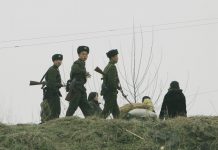
In July 2020, Kaesong was put on lockdown when a North Korean defector crossed the inter-Korean border amid the COVID pandemic.
According to media reports, North Korean leader Kim Jong Un ordered a complete lockdown of the city, including a ban on inter-district and inter-regional travel, immediately after receiving a report of the incident on July 24. The next day, the Politburo of the Central Committee held an emergency meeting and declared a state of emergency in Kaesong.
All Kaesong residents had to isolate themselves at home. Emergency quarantine teams – the only people allowed to travel freely in the city at that time – earned illegal cash or cigarettes by delivering needed supplies to families or passing messages between households.
A few days after Kaesong was suddenly sealed off, people from food-insecure families, the elderly and infirm, and those living alone began collapsing from anemia and hunger. At the same time, a handful of suspected cases of COVID-19 appeared.
The nervous Kaesong Party Committee sent an emergency proposal directly to Kim Jong Un. The proposal said that Kaesong residents were suffering and their livelihoods were being jeopardized by the sudden early lockdown imposed after the defector’s illegal return to the city and by the appearance of suspected cases of COVID-19.
The Kaesong Party Committee’s proposal called for preparations for a “special situation” because Kaesong is a border town on the inter-Korean border. This meant that the government should take into account the possibility that Kaesong residents might make an “extreme choice” – defection to the South – if pushed to the brink.
North Korea’s leadership hurriedly reacts
Aware of the seriousness of the situation, the North Korean authorities quickly sent supplies to Kaesong at the request of the city’s party committee. The authorities also sent Choe Ryong Hae, the country’s number two official, to the city. Choe inspected quarantine checkpoints around the city, checked the delivery of supplies and held talks with quarantine officials on the spot.
He ordered the quarantine officials to carry out disinfection and quarantine activities strictly “in accordance with epidemiological requirements” and in line with the “intensive and continuous efforts to ensure supplies such as food and medicine required by the situation of Kaesong residents” in accordance with the party and state measures.
One Kaesong resident recalled the sense of extreme urgency at the time. “When the authorities announced that a defector had returned from the South, people whispered that if it was so easy to return to the North, it must be easy to defect to the South,” he said. “Thank God they gave us some supplies. Otherwise, with South Korea so close, we might all have decided to defect to the South.”
In other words, if the North Korean authorities had tightened the blockade without taking measures such as providing emergency supplies and rushing Choe Ryong Hae to the city to check on things, an unthinkable mass defection might have occurred.
“Even now, if you ask Kaesong residents what was the most difficult time during the three-year COVID-19 pandemic, they would answer that it was when the defector returned from the South and the city was suddenly put under lockdown, with authorities closing markets, banning travel and even preventing people from drawing water from public faucets or wells outside their villages,” the Kaesong resident said.
Translated by David Black. Edited by Robert Lauler.
Daily NK works with a network of sources living in North Korea, China, and elsewhere. Their identities remain anonymous for security reasons. For more information about Daily NK’s network of reporting partners and information-gathering activities, please visit our FAQ page here.
Please send any comments or questions about this article to dailynkenglish@uni-media.net.

















